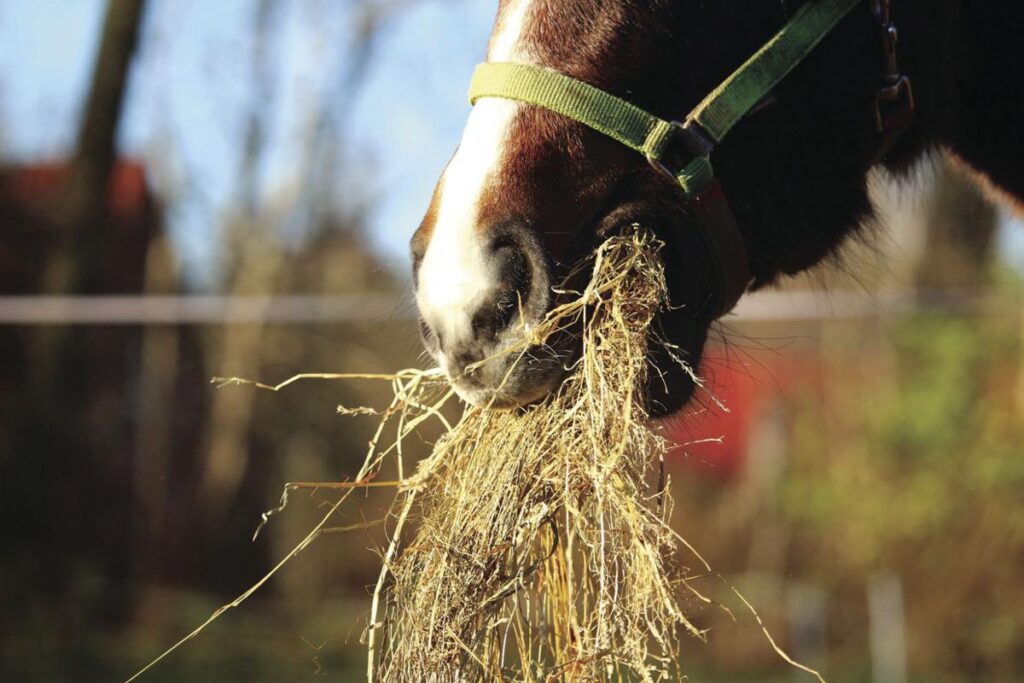If you’re wondering how to increase fiber in your horse’s diet, you’ve come to the right place. Fiber is an essential component of a horse’s diet as it plays a crucial role in maintaining digestive health and overall well-being. We will explore the importance of fiber, different types of fiber sources for horses, how to balance fiber with other nutrients in your horse’s feed, and how to monitor your horse’s digestive health when increasing fiber intake.
Understanding the Importance of Fiber in a Horse’s Diet
Fiber is a non-digestible carbohydrate found in forages such as hay, grass, and pasture. It provides bulk to the diet and helps promote healthy digestion. Horses have a unique digestive system designed to efficiently process fiber-rich foods. Consuming adequate amounts of fiber is essential for preventing digestive issues such as colic and maintaining a healthy gut microbiome.
When horses eat fiber, it undergoes fermentation in the hindgut, producing volatile fatty acids (VFAs). VFAs are a source of energy for horses and play a vital role in maintaining overall health. Fiber can also help regulate blood sugar levels and has a positive impact on weight management.
In addition to its digestive benefits, fiber plays a crucial role in maintaining dental health in horses. Chewing on fibrous forages helps wear down the horse’s teeth evenly, preventing sharp points and other dental issues that can arise from a diet lacking in roughage. This natural grinding action also stimulates saliva production, which aids in buffering stomach acid and reducing the risk of ulcers.
Furthermore, the type of fiber in a horse’s diet can impact its mental well-being. Extended periods of grazing on high-fiber forages mimic the natural browsing behavior of horses in the wild, promoting mental stimulation and reducing stress levels. This behavioral enrichment is essential for overall equine welfare and can help prevent stereotypic behaviors such as cribbing or weaving.
Different Types of Fiber Sources for Horses
Various fiber sources are available to incorporate into your horse’s diet. The most common ones include hay, haylage, pasture, and beet pulp. Hay is a staple forage and is categorized into different types, such as timothy, alfalfa, and orchard grass. Each type has its own nutritional profile, so choosing the one that suits your horse’s needs is essential. Haylage is fermented hay, which can be a great alternative for horses with respiratory issues.
Pasture is an excellent source of fiber, especially during the grazing season. It provides horses with fresh, natural forage and allows them to exercise while obtaining essential nutrients. Beet pulp, although not a forage, is a highly digestible fiber source that can supplement a horse’s diet and can be fed dry or soaked before feeding to ensure hydration.
Soy hulls are another fiber source that can be beneficial for horses. They are a byproduct of soybean processing and are rich in highly digestible fiber, making them a valuable addition to a horse’s diet. They can help improve digestive health and provide a source of energy for working horses. When introducing soy hulls to a horse’s diet, it’s important to do so gradually to allow their digestive system to adjust.
Oat hay can be a suitable option for horses that require additional fiber in their diet. It is high in fiber and low in protein, making it ideal for horses that need to maintain a healthy weight. The coarse texture can also serve as a good source of roughage for horses with dental issues, as it can help promote dental wear. When feeding oat hay, monitoring your horse’s intake is essential to prevent overconsumption and potential digestive issues.
Remember that not all fiber is created equal. Some fibers are more fermentable in the hindgut, providing a greater energy source for your horse. Understanding the different fiber types and their effects on digestion can help you tailor your horse’s diet for optimal health.
Balancing Fiber with Other Nutrients in Your Horse’s Feed
While fiber is essential, it’s crucial to maintain a balanced diet for your horse. Along with fiber, horses require adequate amounts of proteins, vitamins, minerals, and fats. It is recommended that you work with a qualified equine nutritionist or veterinarian to develop a feeding program that meets your horse’s specific needs.
You can introduce concentrated feeds such as grains or pelleted feeds to balance fiber with other nutrients. These feeds are formulated to provide the necessary nutrients while complementing the fiber in your horse’s diet. However, it’s essential to introduce them gradually and monitor your horse’s response to ensure they are tolerating the changes well.
Proteins are crucial for muscle development and repair in horses. They are made up of amino acids, which are the building blocks of protein. When selecting a feed for your horse, ensure it contains high-quality protein sources such as soybean meal or alfalfa to support your horse’s overall health and performance.
Vitamins are vital in various bodily functions, including metabolism and immune response. Vitamin deficiencies can lead to health issues in horses, so it’s important to provide a well-balanced diet rich in vitamins A, D, E, and K. Consider adding vitamin supplements to your horse’s feed if their diet lacks essential vitamins.
Monitoring Your Horse’s Digestive Health When Increasing Fiber Intake
When increasing fiber in your horse’s diet, monitoring their digestive health closely is important. Abrupt changes in diet can disrupt the microbial population in the gut, leading to issues such as digestive upset or colic. Gradual changes over a period of 7-10 days will allow the digestive system to adapt. Observe your horse for any signs of discomfort, changes in manure consistency, or appetite.
It’s also essential to provide adequate water intake when increasing fiber intake. Fiber requires water to maintain its bulk and to aid in digestion. Ensure your horse has access to clean, fresh water at all times.
Increasing fiber in your horse’s diet is crucial for their digestive health and overall well-being. Understanding the importance of fiber, incorporating different fiber sources, balancing it with other nutrients, and monitoring your horse’s digestive health are all essential steps to ensure a healthy and happy equine companion.


